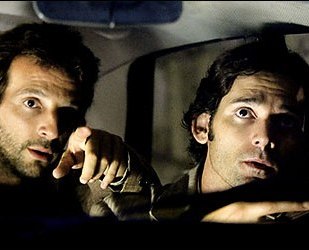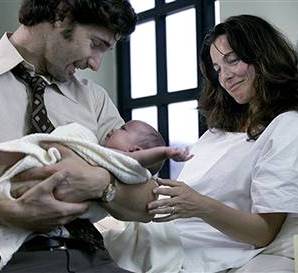 If at times somewhat turgid, Steven Spielberg’s Munich, which I caught this afternoon, is a lively and admirable piece of filmmaking. For the most part, it works as both an expertly-told cloak-and-dagger thriller and a timely rumination on the moral consequences and violent blowback that accompany vengeance as an anti-terror policy. (Indeed, the film infuses Spielberg’s dramatic strengths with contemporary gravitas much more smoothly and profoundly than this summer’s War of the Worlds, which, like Tom Cruise’s earlier Collateral, seemed like it’d be a better movie until taking a tremendously ill-conceived jag in the second hour.) Still, while Munich is assuredly a very good film, ultimately I think the gears grind a bit too loudly at times to consider it a great one.
If at times somewhat turgid, Steven Spielberg’s Munich, which I caught this afternoon, is a lively and admirable piece of filmmaking. For the most part, it works as both an expertly-told cloak-and-dagger thriller and a timely rumination on the moral consequences and violent blowback that accompany vengeance as an anti-terror policy. (Indeed, the film infuses Spielberg’s dramatic strengths with contemporary gravitas much more smoothly and profoundly than this summer’s War of the Worlds, which, like Tom Cruise’s earlier Collateral, seemed like it’d be a better movie until taking a tremendously ill-conceived jag in the second hour.) Still, while Munich is assuredly a very good film, ultimately I think the gears grind a bit too loudly at times to consider it a great one.
After a chilling retelling of the horrible events that forever marred the 1972 Olympics (told mostly through newsfootage at first, with reenactment filling in the details later on) and a grim strategy session presided over by Golda Meir (Lynn Cohen), the film introduces us to Avner (Eric Bana), the family man-cum-Mossad agent assigned to head one of Israel’s deep-undercover response teams. Comprised of embittered wheelman Steve (Daniel Craig), nebbishy bombmaker Robert (Matthieu Kassovitz), resigned forger Hans (Hanns Zichler), and conflicted clean-up man Carl (Ciaran Hinds), Avner’s team crisscrosses various scenic European vistas, clumsily dealing death to the alleged perpetrators of the Munich tragedy. (One would think an assassination squad that included James Bond, Julius Caesar, and the Hulk wouldn’t have as much trouble as they do here.) But as the (terrorist and collateral) body count piles up and Avner’s hunters become the hunted, these agents of vengeance increasingly question the righteousness of their retribution, and wonder whether the costly murders they’ve perpetrated have made any dent in the war against Black September.
 The acting in Munich is universally good, with special marks going to Bana and his colleagues, particularly as their early relish for the job shades into reluctance and, eventually, paranoia and abject horror. (Mathieu Amalric and Marie-Josee Croze are also memorable as a French information dealer and Dutch assassin respectively.) And, for most of the film, Spielberg’s direction is exquisite. Still, sadly, there are some flaws — The pacing of Munich noticeably lags in the middle hour. And, more troubling, the film seems to strain visibly at times to seem arty and high-minded. For every few import-laden scenes executed with a deft touch (for example, the sequence in which Avner’s team shares a safehouse with a PLO cell), there’s one where the symbolism seems just a tad inflated. (Particularly egregious in this regard is the, ahem, climax, which intercuts the Munich massacre with scenes of a tortured-looking Avner having sex with his wife. What, exactly, does this mean? Are love and war meant to seem oppositional or synchronous? Is this union the “home” that Israel must protect, or what? Whatever the intended message, the scene comes across as not only opaque but overblown.)
The acting in Munich is universally good, with special marks going to Bana and his colleagues, particularly as their early relish for the job shades into reluctance and, eventually, paranoia and abject horror. (Mathieu Amalric and Marie-Josee Croze are also memorable as a French information dealer and Dutch assassin respectively.) And, for most of the film, Spielberg’s direction is exquisite. Still, sadly, there are some flaws — The pacing of Munich noticeably lags in the middle hour. And, more troubling, the film seems to strain visibly at times to seem arty and high-minded. For every few import-laden scenes executed with a deft touch (for example, the sequence in which Avner’s team shares a safehouse with a PLO cell), there’s one where the symbolism seems just a tad inflated. (Particularly egregious in this regard is the, ahem, climax, which intercuts the Munich massacre with scenes of a tortured-looking Avner having sex with his wife. What, exactly, does this mean? Are love and war meant to seem oppositional or synchronous? Is this union the “home” that Israel must protect, or what? Whatever the intended message, the scene comes across as not only opaque but overblown.)
Still, not to miss the forest for the trees, Munich is a movie well worth-seeing, the rare thriller that’s not afraid to grapple with today’s thorniest political questions, and without insulting the audience’s intelligence by giving easy, simple-minded answers to seemingly insoluble problems. The film may at best be a long triple, but, to his credit, at least Spielberg is swinging for the fences.
